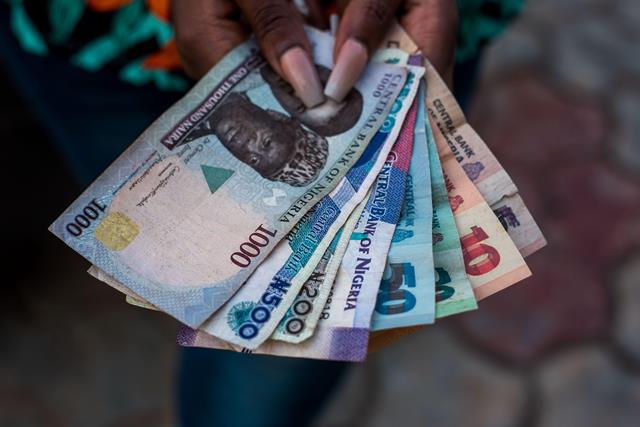 October 2022: Nigerian bank notes. [photo: Tolu Owoeye/ Alamy]
October 2022: Nigerian bank notes. [photo: Tolu Owoeye/ Alamy]
[This is an excerpt from an article in The Round Table: The Commonwealth Journal of International Affairs. Opinion pieces do not represent the views of the editor or the editorial board of the journal.]
Nations have important national symbols that define their existence. Among these symbols, currency has been described as the most pervasive. While other symbols are latent in people’s daily lives until they are projected at major ceremonies, engagements with national currencies and banknotes are quotidian routine. In response to certain exigencies (such as hyperinflation, counterfeiting of existing currencies, among others), countries may carry out currency reforms. However, currency reforms are usually risky and success may not be guaranteed. The key factors that may determine a successful outcome include a strong commitment by the central bank, a strong political will on the part of government, and a favourable disposition to the reforms by the public, businesses and corporations, and the international community (Lonnberg, Citation2013).
Nigeria has carried out currency reforms at different times in its history. The latest in the series followed an announcement made by the sacked Governor of the Central Bank of Nigeria (CBN), Godwin Emefiele, in October 2022 that the highest naira denominations (200, 500, and 1000) would be redesigned. The rationales provided include a determination to tackle: banknote hoarding by the members of the public leading to a shortage of clean banknotes; high rate of currency counterfeiting in the country; and the menace of kidnapping for ransom, among others. The redesigned notes were eventually released into circulation on 15 December 2022 and were to co-exist with the old naira notes until 31 January 2023 when the old notes would cease to be legal tender. However, the scarcity of the redesigned naira notes led to the extension of the validity period of the old notes to 10 February 2023.
Research Article – Digital technology and democracy in Nigeria: a study of how technology is transforming elections without necessarily deepening democracy
Opinion: Nigeria and the flawed 2023 elections
There was a strong opposition to the policy from the public and from those in authority. The policy clearly has political trappings. The former president, Muhammadu Buhari, had stated that the policy would allow him to bequeath to Nigerians a legacy of free and fair election. He had hoped that the policy would deprive politicians of cash for vote-buying, which has been an albatross around the neck of Nigeria’s electoral democracy. The timing of the policy lends credence to this thinking, as the policy was implemented only a few weeks before the 2023 general elections. The political calculations of the promoters of the policy notwithstanding, politicians still outsmarted the system by using their links with bank executives to access cash. Furthermore, Godwin Emefiele’s interest in contesting the 2023 presidential election under the platform of the All Progressives Congress created grounds to look at the policy through political lenses.
Many keen watchers believe that the policy was poorly managed. Rather than circulate the new naira notes to Nigerians in dire need of them, these notes found their way into the hands of politicians, private persons, and Point of Sale (POS) operators who provided the new notes to the public at high cost. Many platforms for transactions provided by banks did not perform optimally during this period, leading to insinuations that the glitches were deliberately created to sabotage the policy. Another management deficit relates to the poor level of awareness about the policy. When the implementation began, it became clear that the people in the rural areas were not fully aware of it.
Furthermore, the policy made Nigerians worse-off economically. It prevented the average Nigerian from fulfilling his/her usual daily obligations. While the old naira notes were being rejected at the marketplace, it was difficult to access new naira notes due to a scarcity of them. The policy increased the level of hunger across the country and made the average Nigerian frustrated and angry. The increasing frustration and anger led to civil unrest in some parts of the country, including attacks on banks. The policy also constrained small and medium scale businesses. Because of the problems induced by the policy such as low patronage and lack of access to cash to run these businesses, many of them stopped operations after recording major losses.
Rotimi Ajayi is Professor of Political Science, Federal University Lokoja, Nigeria and Segun Oshewolo is Senior Lecturer, Department of Political Science, Afe Babalola University, Ado-Ekiti, Nigeria.



